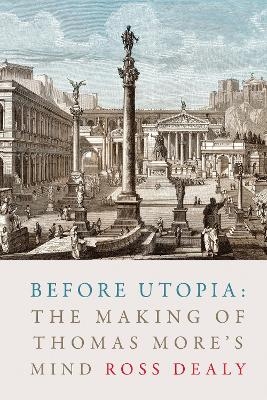
Before Utopia
University of Toronto Press (Verlag)
978-1-4875-0659-9 (ISBN)
Before Utopia demonstrates that Thomas More’s Utopia (1516) is not, as is widely accepted, a rhetorical play of spirit but is instead built from a particular philosophy. That philosophy is not Platonism, but classical Stoicism.
Deeply disturbed in his youth by the conviction that he needed to decide between a worldly and a monastic path, Thomas More was transformed in 1504 by Erasmus’ De taedio Iesu and Enchiridion. As a consequence, he married in 1505 and wholeheartedly committed himself to worldly affairs. His Lucian (1506), written after working directly with Erasmus, adopts the Stoic mindset; Erasmus’ Praise of Folly (1511) shows from beginning to end the workings of More’s life-changing Stoic outlook. More’s Utopia then goes on to systematically illustrate the Stoic unitary two-dimensional frame of thought within an imaginary New World setting.
Before Utopia is not just a book about Thomas More. It is a book about intellectual history and the movement of ideas from the ancient world to the Renaissance. Ross Dealy emphasizes the continuity between Erasmus and More in their religious and philosophical thought, and above all the decisive influence of Erasmus on More.
Ross Dealy is a retired associate professor at St. John’s University, NY.
Preface
Abbreviations
Introduction: In Search of the Meaning of Utopia
Part I: The Mystery of More’s "Either/Or" 1505 Decision: Bodily and Mental Issues before Late 1504
1. Religion, Law, and Humanism
2. The Lectures on Augustine’s City of God (c. 1501)
3. The Translations of Pico’s Writings (1504)
4. The Despairing Letter to Colet (1504)
5. January 1505: An Ambivalent Decision?
Part II: More’s Radically New, Both/And, Paradigm: Erasmus’ De taedio Iesu and the Enchiridion, 1503
1. Thomas More’s Transformation: A First Reading of De taedio Iesu and the Enchiridion
2. Erasmus’ Biography of More
3. The Unexplained Explained
Part III: More’s Lucian, 1506 – and Utopia: Teaching Stoic Two-Dimensional Christianity
1. Joy and the New Frame of Mind
2. A New Analysis of Saints’ Lives
3. The Role of Cynicus and Menippus
4. Modelling Books I–III of De officiis
5. A Relationship to Utopia?
Part IV: Thomas More as Unitarily "Democritus" and "The Man For All Seasons": Erasmus’ Preface to The Praise of Folly, 1510
Part V: A Stoic/Morean Praise of Folly, 1511: The Praise of Folly Works Out More’s Stoic-Framed Transformation
1. The Rhetoric Is Brilliant but Secondary
2. Is Reality Abstract or Worldly? Or Both?
3. Truth Is "Truer Than Truth Itself" (The Stoic Unitary Both/And)
4. Highest Piety Is Unitarily Two-Dimensional
5. Why Is Folly Silent Regarding the Foundation of Her Thinking?
Part VI: Utopian Philosophy, 1516: Epicureanism within a Stoic Honestum/Utile Frame
1. Moral Philosophy
2. Stoic Corrections of Epicureans: Religious Absolutes
3. Stoic Corrections of Epicureans: Moral Absolutes
4. Stoic Utile Expanded
5. Stoic Justice Expanded
6. Corollaries
Part VII: Utopian Warfare: A Unitary Two-Dimensional Mindset
1. Super Machiavellians?
2. "Utter Loathing of War" and Yet a Thoroughly Militarized State
3. Righteous Cunning, Stratagem, and Ferocity
4. Beyond Machiavelli, a Seamless Mindset
Part VIII: What Wiseman Hythloday Did Not Understand
Conclusion
Bibliography
| Erscheinungsdatum | 10.05.2021 |
|---|---|
| Verlagsort | Toronto |
| Sprache | englisch |
| Maße | 155 x 231 mm |
| Gewicht | 780 g |
| Themenwelt | Literatur ► Klassiker / Moderne Klassiker |
| Geisteswissenschaften ► Religion / Theologie | |
| Geisteswissenschaften ► Sprach- / Literaturwissenschaft ► Anglistik / Amerikanistik | |
| Geisteswissenschaften ► Sprach- / Literaturwissenschaft ► Literaturwissenschaft | |
| ISBN-10 | 1-4875-0659-7 / 1487506597 |
| ISBN-13 | 978-1-4875-0659-9 / 9781487506599 |
| Zustand | Neuware |
| Haben Sie eine Frage zum Produkt? |
aus dem Bereich


